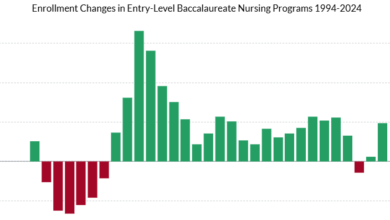Next government needs to elevate social care, nurses urge

Delayed discharges, underfunded care homes and a workforce that feels undervalued and sidelined in favour of healthcare – these are the issues that nurses and leaders said must be addressed to fix the crisis in the social care sector.
For this month’s edition of the Manifesto by Nurses, we asked for solutions to the most pressing challenges in an often-overlooked, but utterly crucial, part of nursing and care.
Funding, resources and the potential of a national care service (NCS) were said to be key solutions. However, the perception and status of social care appeared to be, by far, the most common issue that must be addressed by any political party wishing to govern.
Once the Manifesto by Nurses is complete, Nursing Times plans to deliver it to the main political parties standing in the upcoming general election.
Your social care demands at a glance:
- Creation of a National Care Service
- Better collaboration between NHS and social care providers to speed up discharges
- Fix negative perceptions of social care nursing
- Grant more money to care homes, to recruit and retain staff
- Reform funding for local authorities
- Improve pay for social care nurses, paid carers and support unpaid carers
- Give social care parity with healthcare
What you said
Richard Adams, quality director, Voyage Care
Mr Adams called on a future government to reform local-authority funding to “improve long-term planning and stabilise the market”.

Richard Adams
He said: “Westminster must establish a consistent approach to how local authorities and integrated care boards commission care, and address the existing ‘postcode lottery’, which only further entrenches existing inequalities across the country.”
He said the work of registered social care nurses, and the rest of the workforce, was “undervalued” by politicians and policy.
He agreed that the status of social care staff must be elevated and asked for a national register of social care workers to “promote greater recognition, and drive recruitment and retention”.
In addition, Mr Adams said a national commissioner for adult social care post would be “welcomed” from a future government.
Anna Selby, executive director for quality, HC-One, Buckinghamshire

Anna Selby
Ms Selby said the social care sector needs more government funding to build its workforce, and that it must make “better use” of what money already exists in the system.
To do this, she suggested using “unused” government funds to upskill the workforce, and move away from “short-term contract cycles” and focus on long-term care.
She said better regulation of social care would attract more investment from the private sector, which, in turn, would drive improvements.
She said: “[This could mean] long-term upgrading and building of dementia-friendly care homes, increasing capacity.
“A care system fit for the future means people will receive high-quality bespoke care, delivered by a skilled and sizeable workforce in fit-for-purpose environments.”
Terry Kirton, NHS staff nurse
Mr Kirton said more money should be put into social care to improve Carer’s Allowance.
This, he said, would help otherwise unpaid – or poorly paid – carers take time off work for loved ones. In turn, Mr Kirton said it could aid with the issue of hospitals being “full” of delayed discharges.
Lianne Ford, registered nurse and lead nurse, Exemplar Health Care

Lianne Ford
Ms Ford said a “shift” in the perceptions of social care must happen to address workforce shortages.
“I hear many assumptions that you become ‘deskilled’ as a social care nurse, or you’ll just be caring for people at the end of their life, but this couldn’t be further from the truth,” she said.
She said closer working between health and social care was “absolutely” needed and drew attention to the challenges social care nurses have in accessing training compared with their health nursing counterparts.
“Person-centred care can only be achieved when health and social care professionals work together. There’s still a clear lack of understanding and respect for the social care sector, and its skilled workforce,” Ms Ford said.
She called on universities to spread more information and learning on social care nursing. She added: “I’d suggest this is supported by an equal split of placement time between the health and the independent, voluntary and social care sectors.”
Ms Ford also called for preceptorship schemes for all nursing roles, echoing demands made by healthcare nurses in previous editions of the manifesto.
Marilyn Eveleigh, independent nurse, East Sussex
Ms Eveleigh asked for more registered nurses to staff care homes, including a mandate for at least one to be on duty in the day and accessible at night.
“This nurse should have recognised core clinical competencies and be linked with a general practice team to maximise efficient clinical working,” she said.
She also said improving public health and prevention could have a positive knock-on effect for social care, adding: “Increasing health issues of residents and their ensuing demands – whether obvious or hidden – could be addressed earlier by health promotion, monitoring or early clinical intervention to avoid hospital admission or pressures on primary care or 111.”
Rob Nestor, trainee advanced neonatal nurse practitioner, St George’s University Hospitals NHS Foundation Trust
He called for better nurse wages and a return to the training bursary for nurses.
These, which were also suggested by nurses in the workforce edition of the Manifesto By Nurses, would help attract more people to the profession, he said.
Mr Nestor said these measures should be introduced across the care sector, with better pay scales for carers.
“More funding is needed to [fill] community care gaps and help integrate the NHS with social care,” he said.
“Instead of privatising the NHS, make more of the care sector publicly funded so private companies aren’t taking money from the exchequer that could be spent on people.
“If we look after people’s physical and mental health, and care in hospitals and the community, the increased costs from the above will pay for themselves.”
Anthony Birmingham, registered nurse and manager, Positive Individual Proactive Support

Anthony Birmingham
He said “parity” between health and social care was key to solving the challenges the sector faces and that, currently, social care was sometimes perceived as “an afterthought, rather than an equal partner”.
For university courses, he asked for a minimum number of lecturers and guest speakers with experience in social care to deliver course content.
Furthermore, Mr Birmingham said mandatory placements in social care for nursing courses should be introduced.
For those already in the workforce, he said encouragement and support for social care workers to access education was needed to help elevate the profile of the sector and allow more people to progress to registered nurse or nursing associate-level qualifications and jobs.
He also said wellbeing support for social care staff should be improved, as it would help prevent people leaving their jobs and the workforce shrinking.
Mr Birmingham said if a national care service is considered, parity with the NHS should be ensured from the outset.
Professor Irene Gray, registered nurse and consultancy director

Irene Gray
Professor Gray, a former social care nurse who specialised in older people’s care, described a persisting “stigma” around social care and said integrated care systems and the NHS do not integrate enough with it.
She said: “Training, rarely, if ever, touches the care home system. We are really missing an opportunity.
“Caring for older people should be seen as a fundamental specialty. If nurses were able to experience and understand the value of caring for the older adult in a home environment… more would join the system.”
She referred to the large build-up of patients awaiting discharge to a care home and said care homes “must be appropriately funded” and local authorities given the resources to do so. Professor Gray added that a national care service (NCS) – a social care accompaniment to the NHS – could help with this.
Download a PDF of the social care chapter below.






